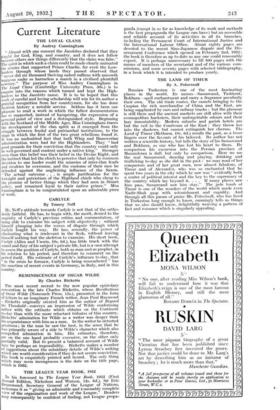Current Literature
" Almost with one consent the Jacobites declared that they ought for God, King, and country, and it does not follow use others saw things differently that the claim was false."
e spirit in which such a claim could be made clearly animated he armies that supported Prince Charlie, for even the Low- nders through whose lands they passed observed that never did six thousand theiving naked ruffiens with uncowth
appons make so harmeless a march iu a civilised plentifull cowntry." The purpose of Miss Audrey Cunningham in The Loyal Clans (Cambridge University Press, 30s.) is to enquire into the reasons which turned and kept the High- landers to the Jacobite cause. It is to be hoped that this work of careful and loving scholarship will win for its author a grateful recognition from her countrymen, for she has done Scottish history a notable service. Seldom has it been our pleasure to read a work in which the fullest documentation has so supported, instead of hampering, the expression of a personal point of view and a distinguished style. Beginning with the Scotland of the Middle Ages, Miss Cunningham traces the development of the clan spirit as it emerged from the struggle between feudal and patriarchal institutions, to the stage in which the first of the two great rebellions found it. It was an undoubted fact that both Whig and Hanoverian administration were bad for the Highlanders. They " had good grounds for their conviction that the country could only be well-governed and content under a native king." Stronger even than this belief was their belief in the Divine Right, and the instinct that led the chiefs to perceive that only by common devotion to one leader could the miseries of inter-clan feuds and rivalries be overcome, and the customs of their race be defended against the anglicizing influence of the Saxon.
The actual outcome . . . is ample justification for the foresight and patriotism of the Highland chiefs who clung to the promise of better things which they had seen in Stuart policy, and remained loyal to their native prince." Miss Cunningham is to be congratulated upon an admirable piece of work.






























 Previous page
Previous page